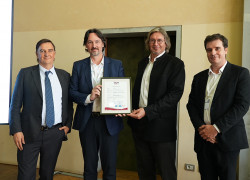PwC Luxembourg sees steady growth in the Luxembourg securitisation market
Confidence is on the rise among professionals
The financial crisis has had an impact on the European securitisation market. Such transactions still suffer from a bad reputation. Yet in Luxembourg, the business has increased steadily since 2004. The country’s regulatory advantages have encouraged this constant growth
Holger von Keutz, partner and Securitisation leader, PwC Luxembourg
On 14 May, PwC Luxembourg held its annual “Securitisation breakfast” which brought together more than 70 market players, including corporate service providers, lawyers and professionals of the finance sector. Conference speakers focused on the Luxembourg securitisation market trends after the recent adoption of the Alternative Investment Fund Managers Directive (AIFMD). They examined the investment opportunities for insurance companies in the context of Solvency II and provided an update on the regulatory and tax changes that can affect the securitisation market.
Professionals are optimistic about the Luxembourg securitisation market outlook
Luxembourg’s law on securitisation, established on 22 March 2004, offers an attractive regime for securitisation vehicles (SV) allowing them to acquire a wide spectrum of claims and receivables and issue securities to investors.
Since then, the securitisation market has grown significantly. By the end of 2013, close to 900 securitisation companies had conducted a significant number of securitisation transactions, positionning Luxembourg as one of the largest European securitisation domiciles.
“The financial crisis has had an impact on the European securitisation market. Such transactions still suffer from a bad reputation. Yet in Luxembourg, the business has increased steadily since 2004. The country’s regulatory advantages have encouraged this constant growth,” said Holger von Keutz, partner and Securitisation leader, PwC Luxembourg.
Currently, the main asset classes include auto loans, structured investment products for retail clients, non-performing loans, consumer loans, real estate loans and private equity structures.
Structured products linked to the performance of an underlying for the retail market, funds, private equity structures as well as auto loans and auto leasing receivables are expected to grow in the future according to participants. While tax legislation, the wide range of asset classes and the possibility to create compartments are seen as the main benefits of the Luxembourg market, regulatory requirements at the national and EU level remain their main concern.
AIFMD: impact on securitisation in detail
“The implementation of the law in 2004 proved that Luxembourg is a proactive financial centre. It is also one of the first countries in Europe to transpose the AIFM Directive into national law, in July 2013,” added Holger von Keutz.
Last year, market players expressed their concern regarding the implications of the AIFM law on Luxembourg securitisation vehicles ("Lux SVs"). Luxembourg securitisation law of 2004 allows for almost any asset producing a regular flow of income or any risk to be securitised. But based on the definition of an Alternative Investment Fund (AIF), Lux SVs may fall within the scope of the AIFM law, except for Securitisation special purpose entities whose definition is slightly different.
To clarify the situation, the CSSF produced a Q&A that details which Lux SVs fall within the scope of the AIFM law and which do not. As a result, Lux SVs that securitise credit risks, that issue only debt instruments and that are not managed in accordance with a defined investment policy like the ones that issue structured products offering synthetic exposure to assets do not qualify as AIF.
Securitisation: an investment alternative for insurance companies
Further growth of the Luxembourg securitisation market could be spurred by recent regulatory changes affecting the insurance industry, such as Solvency II, which will come into force in 2016.
“Solvency II increases the attractiveness of debt investments in real asset classes. Insurers will become more inclined to invest in securitisation vehicles: capital investment will be a key driver for investment allocation, and standard models under Solvency II may prefer debt investment over fund investments,” explained Oliver Schachinger, partner at PwC Luxembourg.
This event concluded on the impact of CRD IV on securitisation vehicles and the tax rules applicable.
Communiqués liés
A Europe First: PwC Luxembourg achieves European Data Protec...
PwC Luxembourg is delighted to announce it has achieved the European Data Protec...
PwC Luxembourg welcomes New Head of Human Resources, Delphin...
PwC Luxembourg is delighted to welcome its new Head of Human Resources, Delphine...
Emerging Trends in Real Estate®: Europe 2024
According to the latest Emerging Trends in Real Estate® Europe report from PwC ...
PwC Luxembourg: Best ESG (Environmental, Social and Governan...
The CFI.co judges have conferred on PwC Luxembourg the 2023 award for Best ESG (...
New Managing Partner and the Country Leadership Team for PwC...
It is with great pleasure that PwC Luxembourg announces that François Mousel as...
Use of Data Analytics and Artificial Intelligence in Luxembo...
PwC Luxembourg has just released the results of its survey: “Use of Data Analy...
Il n'y a aucun résultat pour votre recherche







